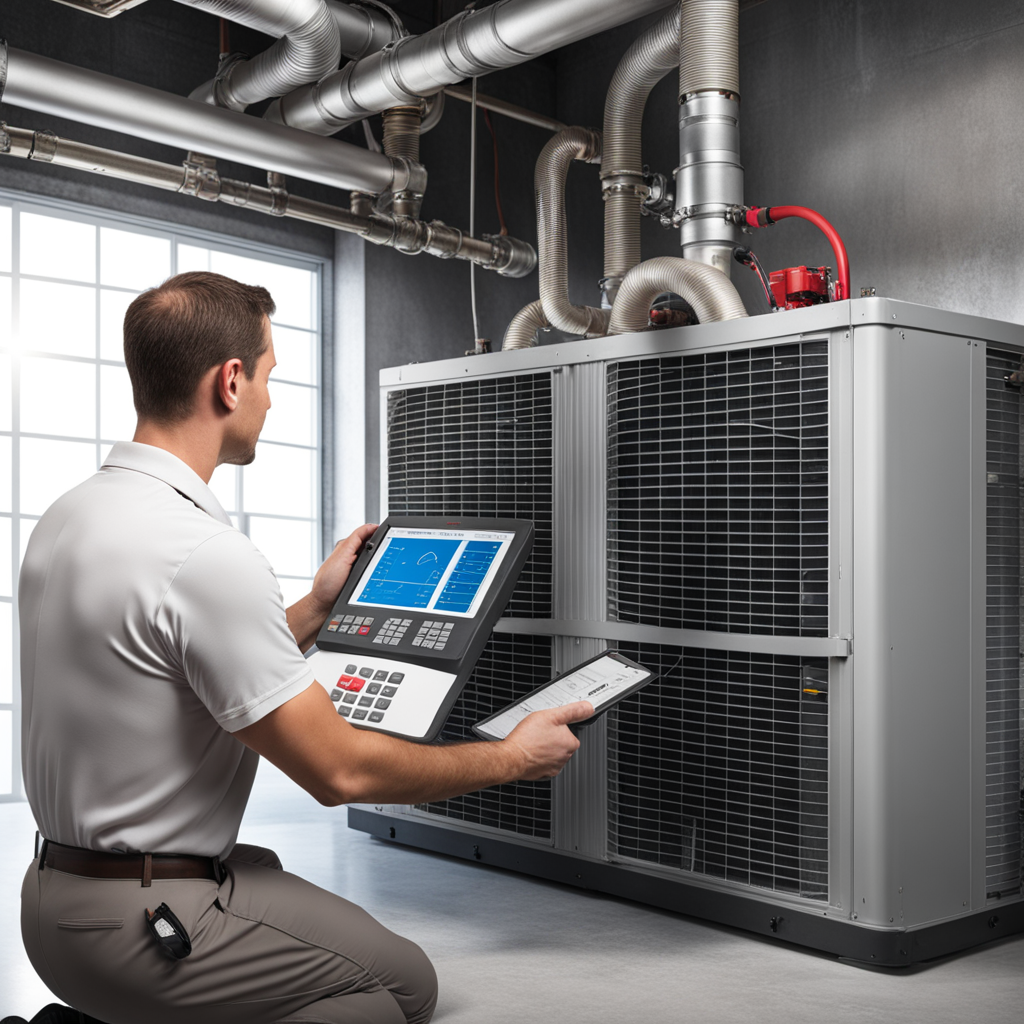 Air Balance Report" width="1024" height="1024" />
Air Balance Report" width="1024" height="1024" /> Air Balance Report" width="1024" height="1024" />
Air Balance Report" width="1024" height="1024" />
The HVAC air balance report is essential to ensure that the air quality of a building is safe and comfortable. It ensures that the system is properly designed and installed, and operates correctly.

The air balance report is conducted through a series of tests to measure the volume of air delivered, the rate of recirculation, ventilation, and the balance between supply and return air. It is then compared to industry standards. This allows us to customize the HVAC system to meet the specific needs of the building occupants. Moreover, it helps to maintain proper air flow for all rooms or areas of the building.
Conducting a balance report also helps to identify any potential issues related to air quality, such as mold and airborne allergens.
Furthermore, conducting an HVAC air balance report allows us to make adjustments to the system to meet the changing needs of the building. This can help to reduce energy usage and save money.
In summary, conducting an HVAC air balance report is essential to ensure that the air quality of a building is safe and comfortable. It helps us identify any potential issues related to air quality while uncovering any HVAC system deficiencies. Additionally, it allows us to make adjustments to the system to meet the changing needs of the building and save energy.
Conducting a balance report ensures that the air quality of a building is safe and comfortable. It helps us customize the HVAC system to meet the specific needs of the building occupants and maintain proper air flow. Furthermore, it allows us to identify any potential issues related to air quality, such as mold and airborne allergens.
Moreover, the report assists us in making adjustments to the system to meet the changing needs of the building, thus increasing energy efficiency and reducing costs. By conducting an HVAC air balance report, we can save energy while ensuring optimal comfort and air quality.
In conclusion, the benefits of conducting it are immense. Not only does it ensure that the air quality of a building is safe and comfortable, but also it helps to identify any potential issues and uncover system deficiencies. Moreover, it allows us to make necessary adjustments to the system to meet the changing needs of the building and improve energy efficiency.

Assessing air quality with an HVAC air balance report is essential to ensure proper air quality in buildings. This allows for customization of the HVAC system to meet the specific needs of the building occupants.
Conducting an air balance report helps to identify any potential issues related to air quality, such as mold, dust, or airborne allergens. It also can uncover any HVAC system deficiencies that must be addressed in order to maintain optimal efficiency. This ensures the safety and comfort of the building occupants.
The report also helps to make necessary adjustments to the system to meet the changing needs of the building. This can help reduce energy usage and cost, while increasing energy efficiency and saving money.
In summary, assessing air quality with an HVAC air balance report is essential to ensure the safety, comfort and air quality of a building. It helps to identify any potential issues related to air quality as well as uncover any HVAC system deficiencies that must be addressed. Additionally, it allows us to make adjustments to the system to meet the changing needs of the building and increase energy efficiency.
An air balance report is essential for uncovering HVAC system deficiencies which can negatively impact air quality in a building. The report is conducted through a series of tests to measure the volume of air delivered, the rate of recirculation, ventilation, and the balance between supply and return air.
When conducted, the report helps to identify HVAC system deficiencies, such as poor circulation, insufficient ventilation, incorrect fan settings, inadequate air flow distribution, or restricted ducts. These issues must be addressed in order to maintain optimal efficiency and increase energy efficiency.
Additionally, the report helps to identify any potential issues related to air quality, such as mold, mildew, dust, or airborne allergens. This ensures the safety and comfort of the building occupants.
Furthermore, conducting an air balance report allows us to make necessary adjustments to the system to meet the changing needs of the building. This can help reduce energy usage and cost, while saving money.
In conclusion, HVAC system deficiencies uncovered by a balance report can negatively impact air quality in a building. The report helps to identify any potential issues related to air quality while uncovering system deficiencies. It is also essential to making necessary adjustments to the system to meet the changing needs of the building and improve energy efficiency.

This helps to customize the HVAC system to meet the specific needs of the building occupants and maintain proper air flow.
Moreover, conducting an air balance report helps to identify any potential issues related to air quality, such as mold and airborne allergens.
When conducted, the report assists us in making adjustments to the system to meet the changing needs of the building. This can help to reduce energy usage and cost, while increasing energy efficiency and saving money.
In summary, an HVAC balance report is essential for improving energy efficiency in buildings. It helps to identify any potential issues related to air quality while uncovering any HVAC system deficiencies. Additionally, it allows us to make necessary adjustments to the system to meet the changing needs of the building and increase energy efficiency.
A balance report is essential for adapting to changing needs of a building. This helps to customize the HVAC system to meet the specific needs of the building occupants and maintain proper air flow.
The report also helps to identify any issues related to air quality, such as mold and airborne allergens.
It allows us to make any necessary adjustments to the system to meet the changing needs of the building. This can help to reduce energy usage and cost, while increasing energy efficiency and saving money. It also helps to ensure the safety and comfort of the building occupants.
In conclusion, adapting to changing needs with an HVAC air balance report is essential for maintaining the air quality of a building. The report helps to identify any potential issues related to air quality while uncovering any HVAC system deficiencies. Additionally, it allows us to make necessary adjustments to the system to meet the changing needs of the building and improve energy efficiency.

An HVAC air balance report is essential to ensure the air quality of a building is safe and comfortable, reduce energy usage and cost, increase energy efficiency, and make necessary adjustments to the system to meet changing needs. Furthermore, it helps to identify any potential issues related to air quality, such as mold and airborne allergens, as well as uncover HVAC system deficiencies. In conclusion, conducting an HVAC air balance report offers numerous benefits for building occupants.